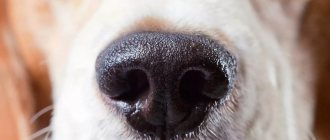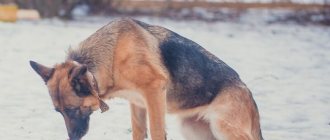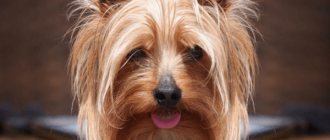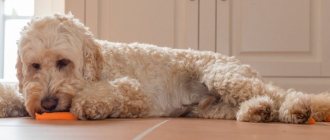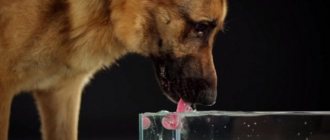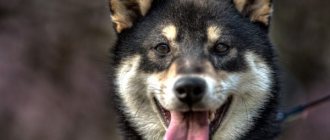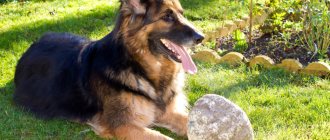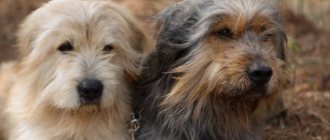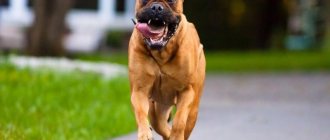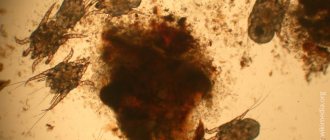Even with careful care, a dog can get sick. The pet's body is incredibly sensitive - it is susceptible to colds, which are accompanied by unpleasant symptoms. A runny nose is one of them. A stuffy nose blocks normal respiratory function, causes swelling and pain, and causes considerable discomfort to the animal. Snot can also indicate the presence of serious pathologies, so at the first suspicion you need to pay a visit to the veterinary clinic, where the doctor will make the correct diagnosis, find the root cause of the problem and suggest effective comprehensive solutions. The doctor will professionally perform an examination, prescribe the necessary tests and individually develop a treatment plan.
Briefly about runny nose in dogs
Rhinitis is an inflammation of the nasal mucosa. In dogs, it occurs both as an independent disease and as a symptom of another pathology. Sometimes it is enough to eliminate the cause and the runny nose goes away without medication, for example:
- Foreign objects in the nasal passages. More often, dogs accidentally inhale plant particles, fur, insects, and sand.
- External irritants - dust, tobacco smoke, strong odors of perfumes, household chemicals.
- Allergens – plant pollen, components of medicines, feed and others.
A runny nose in itself is not life threatening. But sometimes the nasal mucosa becomes inflamed due to dangerous viral and bacterial infections. In older animals, nasal discharge can begin due to abscess of the tooth root, neoplasms of the upper respiratory tract.
If alarming symptoms develop along with a runny nose - fever, apathy, vomiting, diarrhea and others, then you cannot self-medicate. The dog needs to be examined at a veterinary clinic, the root causes of the runny nose are determined and the underlying disease is treated.
Nasal drops are prescribed for infectious rhinitis, inflammation of the mucous membrane due to a decrease in the protective properties of the immune system due to hypothermia and changes in ambient temperature.
Nasal medications act locally, at the site of inflammation. Immunomodulating, antiseptic, and antibacterial drops are produced for animals. More often these are dual-use solutions - for the nose and eyes.
Popular "human" vasoconstrictor nasal medications are contraindicated for dogs, even in pediatric form. They quickly become addictive and lead to the development of chronic rhinitis.
What breeds are at risk?
All four-legged friends with weakened immune systems have no protection against a runny nose, and periodically get sick. Cases of illnesses become more frequent in the off-season, when the weather outside is damp with piercing winds and precipitation. Small decorative dogs react sharply to climate change, while large guard and hunting dogs, which are naturally strong and hardy, tolerate walks through puddles normally.
However, representatives of some breeds are at a special risk group - these are pugs, French bulldogs, sharpeis and other pets with a flattened muzzle. This characteristic anatomical feature makes the nose vulnerable. Through short respiratory tracts, pathogenic infections easily enter the body and cause snot. To help your dog, you need to choose the right medications in a veterinary pharmacy and use safe traditional methods of treatment that are approved by a veterinarian.
Argumistin
Universal antimicrobial drug for animals. The solution is used to treat the skin, eyes, and ENT organs. Nasal drops are available in 10 ml dropper bottles. Prescribed for rhinitis of bacterial, viral, mixed etiology.
Argumistin does not contain antibiotics; it contains 2 powerful antiseptics:
- Colloidal silver at a concentration of 0.001% . Destroys bacteria, complex viruses, fungi. Silver ions penetrate through the membrane into the microbial cell, block vital enzymes, which leads to the death of pathogens.
- Miramistin. It loosens cell membranes, causing essential substances to leak out, and silver particles penetrate inside faster and easier.
Both components stimulate metabolism in the tissues of the nose, constrict blood vessels, reduce swelling, and increase local immunity.
Application
Before treatment, the solution is diluted 1:1 with water for injection. Instill 2 drops into each nasal passage three times a day. The average course of treatment is 10 – 14 days.
Argumistin does not cause burning, dryness, or discomfort of the nasal mucosa. There are no contraindications based on age or health. The shelf life of the medicine in an opened bottle is 14 days.
Before applying any medicinal drops, the nose is freed from secretions, crusts and plaque with a swab soaked in saline solution or warm boiled water.
On the subject: Argumistin instructions for dogs
How does warming work?
If a veterinary medicine specialist has diagnosed rhinitis, the course of treatment may include warming. The procedure is simple, accessible and safe. The main thing is to win over the pet and establish a trusting relationship with it during the manipulation process. You need to stroke the dog, calm it down, and try to cause it a minimum of discomfort.
The warming up steps are as follows:
1. Preparation
Heat salt or sand in a hot frying pan, then pour it into a thick bag made of thick fabric.
2. Applying dry heat
A bag is applied to the problem area, trying to make every movement light and unobtrusive. The procedure should not be accompanied by pain or burns, so it is extremely important to make sure that the sand or salt is not too hot.
3. Lotions
When the manipulations are completed, lotions will help consolidate the result, and the animal will recover faster. Gauze soaked in a warm solution of hydrogen peroxide is applied for 10-15 minutes. During this time, the lotion will dry naturally.
Anandin
Drops for the nose and eyes with an immunomodulatory effect. The drug is prescribed as an additional remedy for rhinitis of any etiology: viral, bacterial, allergic in nature, for inflammation of the nasal mucosa due to hypothermia.
For infectious rhinitis, Anandin not only softens the symptoms of a runny nose, it affects the causes of the disease. The active substance with the difficult name glucaminopropylcarbacridone stimulates the formation of interferons. These are protective proteins that cells produce in response to invasion by infectious agents.
Interferons act as the first line of defense. They stop the spread of pathogens, stimulate other parts of the immune system and give time for the production of antibodies.
In addition, Anandin reduces inflammation and stimulates the healing of microdamages on the mucous membrane.
Application
The solution is instilled three times a day, 2–4 drops into each nostril until the symptoms disappear completely, but not more than 14 days in a row.
In exceptional cases, Anandin may cause an allergic reaction. If the symptoms of a runny nose worsen, you will have to give it up.
Prevention of colds and viral diseases
Strengthening the immune system and improving living conditions will help prevent the development of diseases. To do this, you will need to get all the necessary vaccinations, review the existing diet and walking process.
Vaccination
Annual vaccination protects pets from the most common infections. The production of antibodies after vaccination reduces the likelihood of infection by up to 10%. But even in this case, sick pets experience a mild course and do not suffer from possible complications.
Nutritious food
Health largely depends on nutrition. A lack of vitamins and minerals weakens the body's defenses, so it is very important not to skimp on your pet's diet.
When choosing food, take into account the individual characteristics of the animal: age, gender, breed and physiological condition. It is better to discuss the diet for allergies and gastrointestinal problems with a veterinarian.
Desacid forte
Antibacterial drops with anti-inflammatory, regenerating effects. Here are the main indications for use:
- Treatment of bacterial rhinitis.
- Prevention of infection after injury, foreign objects, irritants.
- Treatment of bacterial dermatitis around the nose.
Dogs more often develop secondary bacterial rhinitis against the background of a viral infection due to a decrease in protective properties.
Desacid forte contains 3 active components:
- Gentamicin is a bactericidal antibiotic. Blocks DNA synthesis of bacterial cells, destroys common pathogens of rhinitis in dogs.
- Chloramphenicol is a bacteriostatic antibiotic. It disrupts the protein synthesis of microbial cells and stops the spread of harmful bacteria.
- Succinic acid is a supporting component. Reduces inflammation, binds toxins and free radicals, stimulates cellular metabolism.
Processing methods
For the treatment of acute rhinitis, Desacid forte is instilled 3–4 times a day, following the dosage:
- cats 1 drop;
- small dogs up to 10 kg 2;
- medium and large dogs over 10 kg - 3.
The course lasts from 5 to 10 days. During treatment, once a day the nose is cleaned of secretions and crusts with a swab soaked in a solution.
To prevent bacterial infection after injury or removal of a foreign object, the solution is instilled 4 times a day at the same dose for 3 days.
To treat dermatitis around the nose, the affected areas are treated 2-3 times a day with a cotton pad soaked in the solution until recovery.
For puppies up to one year old and pregnant females, the drug is prescribed only by the treating veterinarian. After opening the bottle, the solution is suitable for 25 days.
How to relieve the condition at home?
The good news for dog breeders is the fact that with a runny nose, hospitalization for a pet is required in extremely rare, critical situations. You can alleviate the condition and restore your dog’s health at home.
The owner’s primary task is to establish the true cause of the disease. The dog's nose should be carefully examined using a flashlight to ensure that there are no foreign objects in the passages. It is necessary to note all kinds of injuries, damage, scratches. If a foreign body is found, you should try to remove it yourself, or ask a veterinarian about it.
When it comes to a runny nose that appears after a walk in the rain, we can conclude that rhinitis is of a cold nature. Rarely, but it occurs, allergic rhinitis. With various allergic reactions, the dog swells and loses vital energy.
Maxidin
Another immunomodulatory drug. Available in glass bottles of 5 ml. It is sold in boxes of 5 ampoules, but many pharmacies sell it individually.
Maxidin is included in the complex treatment of viral rhinitis and chronic diseases of the upper respiratory tract.
Maxidin is similar to Anandin intranasal drops. The active ingredient - germanium bis(pyridine-2,6-dicarboxylate) - enhances the production of interferons, which inhibit the spread of infectious pathogens, increase the activity of immune cells, and stimulate the formation of antibodies.
Application
Maxidin is instilled 3 times a day, 2 drops until recovery, but not longer than 2 weeks. The drug can be used to treat pregnant dogs and puppies older than 2 months, but under the supervision of the treating veterinarian.
Caring for a sick animal
Proper care will help speed up recovery. During treatment you will have to change your diet, reduce physical activity and insulate your pet’s sleeping place.
Diet and drink
A weakened body needs light but nutritious food. The therapeutic diet involves frequent feeding in small portions. During the first days, the animal is fed low-fat broths, slimy porridges and lean boiled meat. If the food is industrial, dry food is replaced or diluted with wet pates.
To relieve fever and facilitate mucus discharge, it is necessary to ensure compliance with the drinking regime. Change the water twice a day and, if possible, try to warm it to room temperature. In addition to regular water, you can replenish fluid reserves with rosehip decoction, which has an anti-inflammatory effect.
Walks
There is no need to give up walks, but it is better to reduce their duration. In cold, rainy and windy weather, go out solely to relieve yourself, not forgetting about warm overalls. Running, active games and exercises should be prohibited until recovery.
Arrangement of a warm place in the house
The pet's bed should be placed in the warmest and driest place, away from drafts. If the dog lives in a booth or enclosure, do not leave it in the cold and take it into your home.
Reparin Helper
A solution for restoring skin and mucous membranes damaged as a result of mechanical trauma, the harmful effects of viruses and bacteria. Available in the form of drops and spray. Reparin is used to treat wounds and skin lesions, irrigate gums, and drop them into the nose and eyes.
The solution contains no medicinal components; it contains a complex of cytokines. These are information molecules that transmit signals between cells and participate in physiological and pathological processes:
- Regulate the inflammatory response.
- They send immune cells to the affected area, which capture and destroy viruses and bacteria.
- They promote the growth of the capillary network at the site of damage, thereby increasing blood supply, oxygen and nutrient delivery.
- Stimulates the formation of new tissues.
Reparin shortens the treatment period for rhinitis and reduces the risk of complications.
Application
The solution is instilled 1 to 3 times a day, 3 to 6 drops. Course – from 3 days to 2 weeks. The drug does not cause side effects or allergies. It is not contraindicated during pregnancy or for puppies.
Reparin combines well with other drops, including antibacterial ones. But antiseptics can change the structure of the drug’s protein molecules and deprive it of biological activity. Therefore, antiseptic drops and Reparin are instilled at intervals of 5 minutes. After opening the bottle, the drug is suitable for 15 days.
Pinosol
One of the few “human” drugs for the common cold, approved for dogs. The medicine contains a plant complex with mild antimicrobial and anti-inflammatory effects.
Pinosol contains mint, pine, eucalyptus oil, guaiazulene - a synthetic analogue of the active ingredient of chamomile, as well as tocopherol (vitamin E).
Plant complex in Pinosol:
- suppresses pathogenic bacterial microflora;
- reduces inflammation and swelling;
- reduces the viscosity of secretions.
Vitamin E softens, restores mucous membranes, and eliminates discomfort.
Application
Pinosol is instilled 3-4 times a day, 1-2 drops according to the size of the dog. Course – from 3 days to a week.
Medicinal plants often cause allergic reactions in dogs. After the first procedure, you need to wait 20 minutes and check the mucous membranes. If redness occurs and swelling increases, Pinosol is no longer used, and the dog is given an antihistamine.
The main rule in treating animals is to do no harm. Nasal drops help with local inflammation of the nasal mucosa. If any other symptoms develop along with rhinitis, your dog needs veterinary attention.
Main symptoms
If your dog is not breathing through his nose, note all the accompanying signs. They will help the veterinarian make a diagnosis.
The main symptoms of rhinitis include:
- difficulty breathing, accompanied by snoring or wheezing during sleep;
- deterioration or complete loss of smell;
- the appearance of mucous discharge from the nose of varying consistency and intensity;
- sneezing.
With a prolonged runny nose, dried crusts appear inside the nose. Depending on the cause of the illness, the condition may be accompanied by loss of activity, loss of appetite, diarrhea, fever, nausea and lacrimation.

